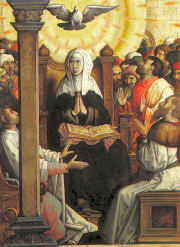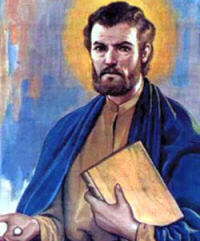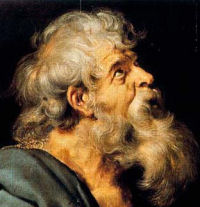» Enjoy our Liturgical Seasons series of e-books!
After the Ascension of Jesus, St. Peter proposed to the assembled faithful that they choose a disciple of Christ to fill the place of the traitor Judas in the first missionary band. Lots were drawn, with the result in favor of Matthias. According to one ancient tradition, this missioner labored in Ethiopia and was martyred there. Thus did St. Matthias receive "the crown of life which God has promised to those who love him". The Church venerates St. Matthias on an equal footing with the other Apostles, whose voices resound throughout the world, from generation to generation, giving testimony of what they saw and heard in their life with our Lord. His name is mentioned in the Canon of the Mass.
Before the reform of the General Roman Calendar St. Matthias' feast was celebrated on February 24. St. Boniface's feast is no longer on the calendar in the United States. He was a martyr of Tarsus whose relics were taken to Rome at an early date.
Eve of Pentecost
 Today is the solemn eve of the great feast of Pentecost. A vigil always implies preparation, a time for cleansing and adorning the soul before the feast. Two themes occupy our attention: a) baptism; b) the graces of Pentecost. In spirit we stand at the font of our baptism to stir up the graces that we once received. There we can meditate upon the pointed words that St. Augustine addressed to a class of neophytes. "Today with the greatest joy Mother Church will give birth to you through holy baptism. By the most sacred sign of the Cross she conceived you in her womb, there she nourishes you and joyfully brings you, her joyful children, to the day of birth. In the holy bath of baptism true light is restored to you.
Today is the solemn eve of the great feast of Pentecost. A vigil always implies preparation, a time for cleansing and adorning the soul before the feast. Two themes occupy our attention: a) baptism; b) the graces of Pentecost. In spirit we stand at the font of our baptism to stir up the graces that we once received. There we can meditate upon the pointed words that St. Augustine addressed to a class of neophytes. "Today with the greatest joy Mother Church will give birth to you through holy baptism. By the most sacred sign of the Cross she conceived you in her womb, there she nourishes you and joyfully brings you, her joyful children, to the day of birth. In the holy bath of baptism true light is restored to you.
"Mother Church is not affected by the punishment inflicted upon Eve who must give birth to her children in pain and sorrow, nor do her children come into the world weeping as those of Eve; you are born with a cry of joy. . . . All the mystery-laden rites that have been performed over you (during your catechumenate) and are still being performed by the ministry of ordained priests, such as the exorcisms, prayers, spiritual songs (psalms), insufflations, penitential garb, bowing the head, prostrations, even the very fear that you experience-all these things are food which should enliven you in the womb so that when reborn in baptism, Mother Church may present you as joyful children to Christ."
"You have already received the Creed; this Creed is your mother's protection against the serpent's venom. In John the apostle's Apocalypse it is written that the dragon stood before the woman who was about to bring forth, that when she had brought forth he might devour her son (12:5). You all know that the dragon is the devil; also, that the woman represents the Virgin Mary, who a virgin herself, gave birth to our Virgin Head. She, moreover, is a type of holy Church; for as Mary remained a virgin in giving birth to a Son, so the Church remains virginal although constantly giving birth to new members."
"You have vowed to renounce the devil, and in this vow that has been recorded not by men but by God and His angels, you have declared: I do renounce him. Renounce him not merely with words, but in your conduct too; not only with the sound of the voice, but in the acts of daily life; not by the speech of lips alone, but with the loud cry of action. Remember that you have joined battle with a wily, skilled, and inveterate enemy; once you have renounced him, never let him discover his own handiwork in you lest he claim the right to drag you away into servitude. For you shall be detected and brought to light, O Christian, whenever your deeds contradict your vow." — The Church's Year of Grace, Pius Parsch
St. Matthias
Mathias was one of the first to follow our Savior; and he was an eye-witness of all His divine actions up to the very day of the Ascension. He was one of the seventy-two disciples; but our Lord had not conferred upon him the dignity of an apostle. And yet, he was to have this great glory, for it was of him that David spoke, when he prophesied that another should take the bishopric left vacant by the apostasy of Judas the traitor. In the interval between Jesus' Ascension and the descent of the Holy Ghost, the apostolic college had to complete the mystic number fixed by our Lord Himself, so that there might be the twelve on that solemn day, when the Church, filled with the Holy Ghost, was to manifest herself to the Synagogue. The lot fell on Mathias; he shared with his brother-apostles the persecution in Jerusalem, and, when the time came for the ambassadors of Christ to separate, he set out for the countries allotted to him. Tradition tells us that these were Cappadocia and the provinces bordering on the Caspian Sea.
 The virtues, labor, and sufferings of St. Mathias have not been handed down to us: this explains the lack of proper lessons on his life, such as we have for the feasts of the rest of the apostles. Clement of Alexandria records in his writings several sayings of our holy apostle. One of these is so very appropriate to the spirit of the present season, that we consider it a duty to quote it. 'It behooves us to combat the flesh, and make use of it, without pampering it by unlawful gratifications. As to the soul, we must develop her power by faith and knowledge.' How profound is the teaching contained in these few words! Sin has deranged the order which the Creator had established. It gave the outward man such a tendency to grovel in things which degrade him, that the only means left us for the restoration of the image and likeness of God unto which we were created, is the forcible subjection of the body to the spirit. But the spirit itself, that is, the soul, was also impaired by original sin, and her inclinations were made prone to evil; what is to be her protection? Faith and knowledge. Faith humbles her, and then exalts and rewards her; and the reward is knowledge.
The virtues, labor, and sufferings of St. Mathias have not been handed down to us: this explains the lack of proper lessons on his life, such as we have for the feasts of the rest of the apostles. Clement of Alexandria records in his writings several sayings of our holy apostle. One of these is so very appropriate to the spirit of the present season, that we consider it a duty to quote it. 'It behooves us to combat the flesh, and make use of it, without pampering it by unlawful gratifications. As to the soul, we must develop her power by faith and knowledge.' How profound is the teaching contained in these few words! Sin has deranged the order which the Creator had established. It gave the outward man such a tendency to grovel in things which degrade him, that the only means left us for the restoration of the image and likeness of God unto which we were created, is the forcible subjection of the body to the spirit. But the spirit itself, that is, the soul, was also impaired by original sin, and her inclinations were made prone to evil; what is to be her protection? Faith and knowledge. Faith humbles her, and then exalts and rewards her; and the reward is knowledge.
—Excerpted from The Liturgical Year, Abbot Gueranger O.S.B.
Symbols and Representation: lance; spear
Patronage: Alcoholism; carpenters; reformed alcoholics; smallpox; tailors; diocese of Gary; Indiana; diocese of Great Falls-Billings, Montana
Highlights and Things to Do:
- Celebrate the triumph of St. Matthias by reading the hymn taken from the Menaea of the Greeks.
- Learn more about St. Matthias:






